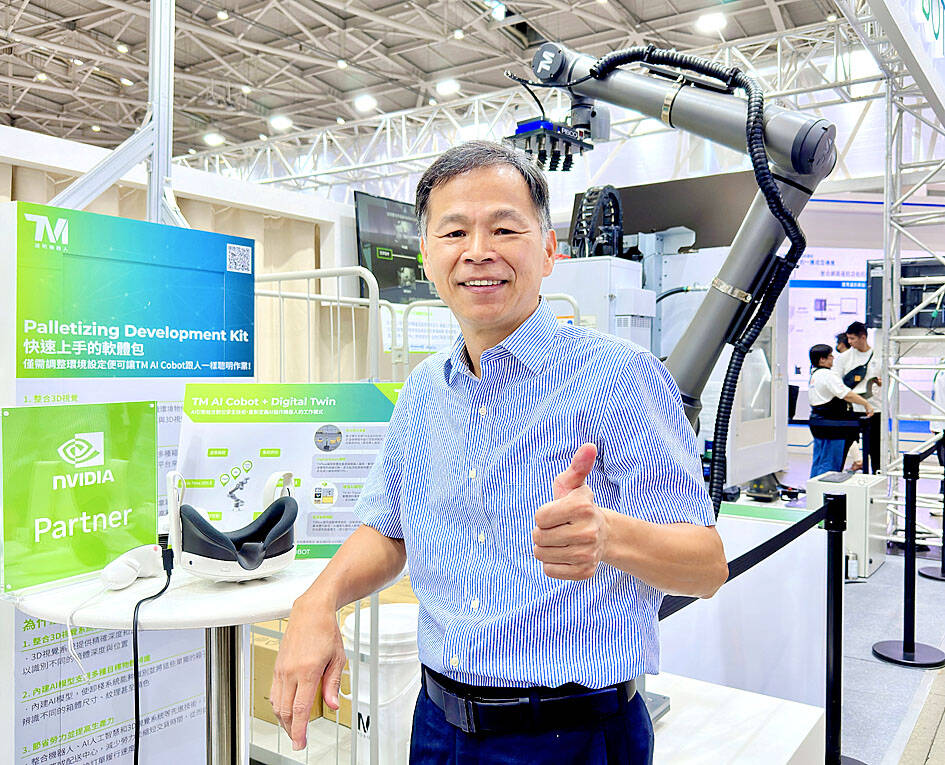Techman Robot Inc (達明機器人), a robotic arm partner of Nvidia Corp, yesterday said it aims to outpace the 20 percent annual growth for the “collaborative robot” (cobot) industry this year, driven primarily from rising demand from southeastern Asia and China.
Techman, a subsidiary of Quanta Computer Inc (廣達電腦), focuses on developing user-friendly robotic systems with integrated vision capabilities. Using artificial intelligence (AI) technologies, Techman’s cobots could recognize the orientation and presence of materials, perform testing and inspection, and dynamically pick and place tasks.
Techman is the world’s No. 2 AI cobot supplier, behind only Odense, Denmark-based Universal Robots. The Taiwanese firm had shipped more than 15,000 AI robots as of September last year.

Photo: Fang Wei-chieh, Taipei Times
“The cobot industry is to grow 20 percent each year. We are targeting more than 20 percent growth this year” in revenue, Techman president Haw Chen (陳尚昊) told reporters on the sidelines of a forum in Taipei.
Techman’s sales posted annual growth of 17.54 percent to NT$1.48 billion (US$45 million) last year from NT$1.26 billion in 2023. The cobot market is expected to expand at an annual compound growth rate of 20.1 percent from this year to 2030, market researcher Mordor Intelligence forecast.
The Asia-Pacific region is to be the growth engine of the company, especially Southeast Asia and China, Chen said.
A majority of Techman’s robotic arms or robotic systems are adopted in industrial automation such as in vehicle manufacturing plants, electronics manufacturers, machinery companies and warehouses, the company said.
The US market is a new growth driver and is expected to see steep growth this year, Chen said.
Last year, Techman set up a warehouse in Indiana to store spare parts in collaboration with its customers and established a hub in El Paso, Texas. The company also has sites in Mexico, along with many other local manufacturers allocating production to the country amid the US-China trade dispute, he said.
Techman does not expect new trade policy from the incoming administration of US president-elect Donald Trump, such as heavy import tariffs, to have adverse impact on its business, Chen said.
“We have to provide on-site services to our customers,” Chen said, adding that the company is following the steps of its customers’ expansion overseas.

UNCERTAINTY: Innolux activated a stringent supply chain management mechanism, as it did during the COVID-19 pandemic, to ensure optimal inventory levels for customers Flat-panel display makers AUO Corp (友達) and Innolux Corp (群創) yesterday said that about 12 to 20 percent of their display business is at risk of potential US tariffs and that they would relocate production or shipment destinations to mitigate the levies’ effects. US tariffs would have a direct impact of US$200 million on AUO’s revenue, company chairman Paul Peng (彭雙浪) told reporters on the sidelines of the Touch Taiwan trade show in Taipei yesterday. That would make up about 12 percent of the company’s overall revenue. To cope with the tariff uncertainty, AUO plans to allocate its production to manufacturing facilities in

TAKING STOCK: A Taiwanese cookware firm in Vietnam urged customers to assess inventory or place orders early so shipments can reach the US while tariffs are paused Taiwanese businesses in Vietnam are exploring alternatives after the White House imposed a 46 percent import duty on Vietnamese goods, following US President Donald Trump’s announcement of “reciprocal” tariffs on the US’ trading partners. Lo Shih-liang (羅世良), chairman of Brico Industry Co (裕茂工業), a Taiwanese company that manufactures cast iron cookware and stove components in Vietnam, said that more than 40 percent of his business was tied to the US market, describing the constant US policy shifts as an emotional roller coaster. “I work during the day and stay up all night watching the news. I’ve been following US news until 3am

Taiwan will prioritize the development of silicon photonics by taking advantage of its strength in the semiconductor industry to build another shield to protect the local economy, National Development Council (NDC) Minister Paul Liu (劉鏡清) said yesterday. Speaking at a meeting of the legislature’s Economics Committee, Liu said Taiwan already has the artificial intelligence (AI) industry as a shield, after the semiconductor industry, to safeguard the country, and is looking at new unique fields to build more economic shields. While Taiwan will further strengthen its existing shields, over the longer term, the country is determined to focus on such potential segments as

COLLABORATION: Given Taiwan’s key position in global supply chains, the US firm is discussing strategies with local partners and clients to deal with global uncertainties Advanced Micro Devices Inc (AMD) yesterday said it is meeting with local ecosystem partners, including Taiwan Semiconductor Manufacturing Co (TSMC, 台積電), to discuss strategies, including long-term manufacturing, to navigate uncertainties such as US tariffs, as Taiwan occupies an important position in global supply chains. AMD chief executive officer Lisa Su (蘇姿丰) told reporters that Taiwan is an important part of the chip designer’s ecosystem and she is discussing with partners and customers in Taiwan to forge strong collaborations on different areas during this critical period. AMD has just become the first artificial-intelligence (AI) server chip customer of TSMC to utilize its advanced